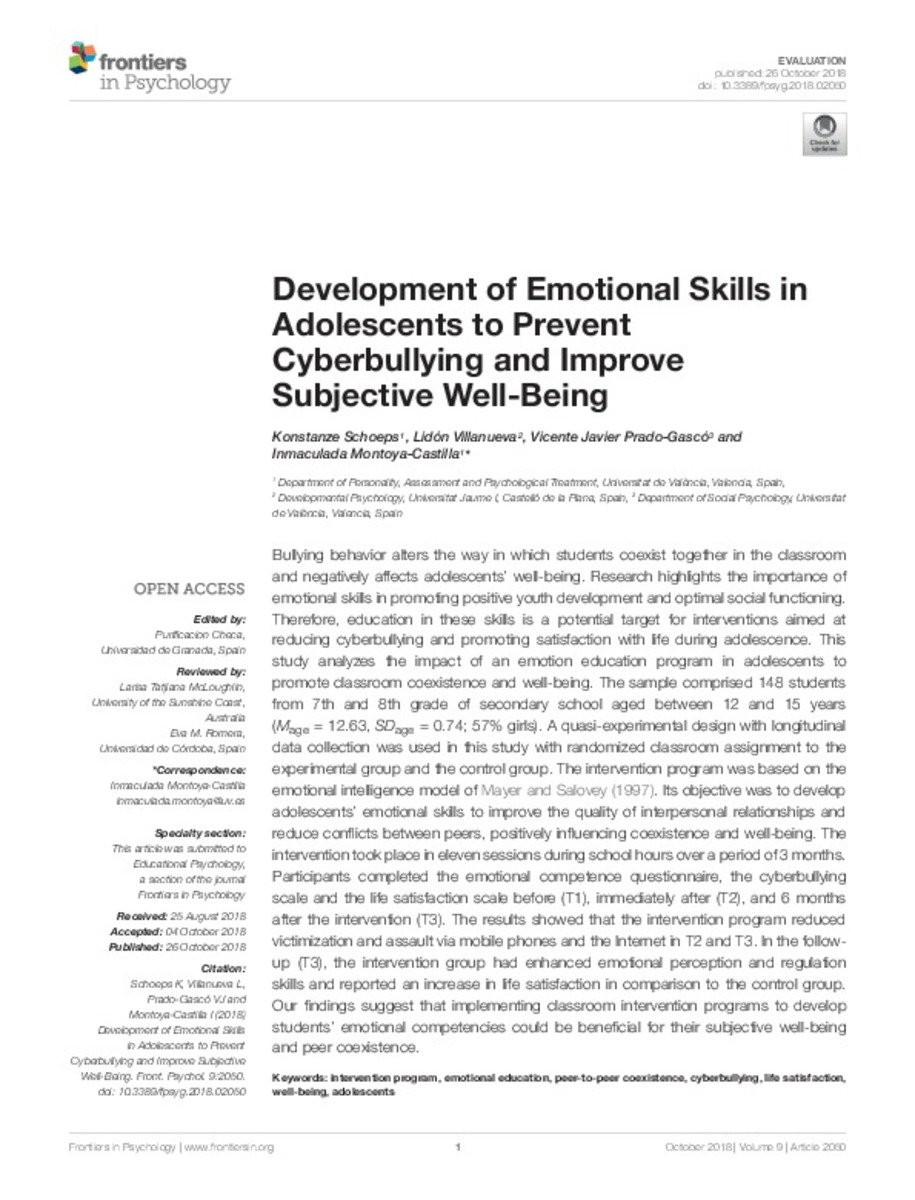Mostrar el registro sencillo del ítem
Development of Emotional Skills in Adolescents to Prevent Cyberbullying and Improve Subjective Well-Being
| dc.contributor.author | Schoeps, Konstanze | |
| dc.contributor.author | Villanueva, Lidón | |
| dc.contributor.author | PRADO-GASCO, VICENTE | |
| dc.contributor.author | Montoya Castilla, Inmaculada | |
| dc.date.accessioned | 2018-12-11T08:28:56Z | |
| dc.date.available | 2018-12-11T08:28:56Z | |
| dc.date.issued | 2018-10-26 | |
| dc.identifier.citation | SCHOEPS, Konstanze; VILLANUEVA BADENES, Lidón; PRADO GASCÓ, Vicente; MONTOYA CASTILLA, Inmaculada (2018). Development of Emotional Skills in Adolescents to Prevent Cyberbullying and Improve Subjective Well-Being. Frontiers in Psychology, v. 9 | ca_CA |
| dc.identifier.uri | http://hdl.handle.net/10234/177993 | |
| dc.description.abstract | Bullying behavior alters the way in which students coexist together in the classroom and negatively affects adolescents’ well-being. Research highlights the importance of emotional skills in promoting positive youth development and optimal social functioning. Therefore, education in these skills is a potential target for interventions aimed at reducing cyberbullying and promoting satisfaction with life during adolescence. This study analyzes the impact of an emotion education program in adolescents to promote classroom coexistence and well-being. The sample comprised 148 students from 7th and 8th grade of secondary school aged between 12 and 15 years (Mage = 12.63, SDage = 0.74; 57% girls). A quasi-experimental design with longitudinal data collection was used in this study with randomized classroom assignment to the experimental group and the control group. The intervention program was based on the emotional intelligence model of Mayer and Salovey (1997). Its objective was to develop adolescents’ emotional skills to improve the quality of interpersonal relationships and reduce conflicts between peers, positively influencing coexistence and well-being. The intervention took place in eleven sessions during school hours over a period of 3 months. Participants completed the emotional competence questionnaire, the cyberbullying scale and the life satisfaction scale before (T1), immediately after (T2), and 6 months after the intervention (T3). The results showed that the intervention program reduced victimization and assault via mobile phones and the Internet in T2 and T3. In the follow-up (T3), the intervention group had enhanced emotional perception and regulation skills and reported an increase in life satisfaction in comparison to the control group. Our findings suggest that implementing classroom intervention programs to develop students’ emotional competencies could be beneficial for their subjective well-being and peer coexistence. | ca_CA |
| dc.format.extent | 12 p. | ca_CA |
| dc.format.mimetype | application/pdf | ca_CA |
| dc.language.iso | eng | ca_CA |
| dc.publisher | Frontiers Media | ca_CA |
| dc.relation.isPartOf | Frontiers in Psychology (2018), v. 9 | ca_CA |
| dc.rights | Atribución 4.0 Internacional | * |
| dc.rights.uri | http://creativecommons.org/licenses/by-sa/4.0/ | * |
| dc.source | https://www.ncbi.nlm.nih.gov/pmc/articles/PMC6212595/ | ca_CA |
| dc.subject | Intervention program | ca_CA |
| dc.subject | Emotional education | ca_CA |
| dc.subject | Peer-to-peer coexistence | ca_CA |
| dc.subject | Cyberbullying | ca_CA |
| dc.subject | Life satisfaction | ca_CA |
| dc.subject | Well-being | ca_CA |
| dc.subject | Adolescents | ca_CA |
| dc.title | Development of Emotional Skills in Adolescents to Prevent Cyberbullying and Improve Subjective Well-Being | ca_CA |
| dc.type | info:eu-repo/semantics/article | ca_CA |
| dc.identifier.doi | http://dx.doi.org/10.3389/fpsyg.2018.02050 | |
| dc.relation.projectID | 1) Spanish Ministry of Economy, Industry and Competitiveness (PSI2013-43943-R); 2) Ministry of Science, Innovation and Universities (PSI2017-84005-R); 3) University of Valencia (UV-INV-PREDOC15-265738) | ca_CA |
| dc.rights.accessRights | info:eu-repo/semantics/openAccess | ca_CA |
| dc.type.version | info:eu-repo/semantics/publishedVersion | ca_CA |
Ficheros en el ítem
Este ítem aparece en la(s) siguiente(s) colección(ones)
-
PSI_Articles [595]
Articles de publicacions periòdiques








